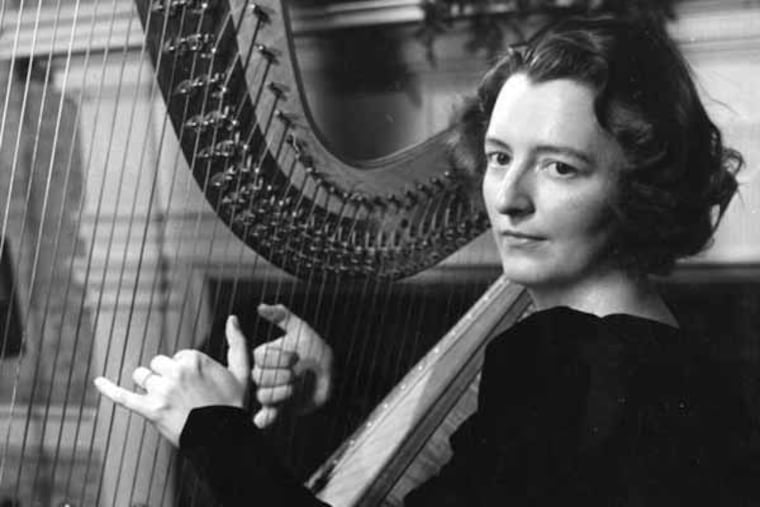Edna Phillips, Philadelphia Orchestra's first female musician
A woman doesn't have the power and stamina to do the job, they said. On the front lines, under intense pressure, she'll buckle. In any case, putting women alongside men won't work; they'll become distractions. The same canards surrounding the arrival of women in combat were being recited during the fall of another prohibition eight decades ago: women in orchestras.

One Woman
in a Hundred
Edna Phillips
and the Philadelphia Orchestra
By Mary Sue Welsh
University of Illinois Press. 241 pp. $35
nolead ends nolead begins
Reviewed by Peter Dobrin
A woman doesn't have the power and stamina to do the job, they said. On the front lines, under intense pressure, she'll buckle. In any case, putting women alongside men won't work; they'll become distractions. The same canards surrounding the arrival of women in combat were being recited during the fall of another prohibition eight decades ago: women in orchestras.
We're used to seeing a roughly equal ratio of gowns to tails on stage today. But when harpist Edna Phillips entered the Philadelphia Orchestra, in 1930, she not only was the orchestra's first female member, she also was the first female principal player in any major U.S. orchestra.
She arrived under less than ideal circumstances, as Mary Sue Welsh details in One Woman in a Hundred: Edna Phillips and the Philadelphia Orchestra. Phillips, from Wyomissing, Pa., was a promising Curtis Institute of Music student, but still shy of full training when she joined the orchestra at 23. She was rusty after months of being sidelined by illness, and the fact that she was replacing a popular player who had been fired did not immediately endear her to her colleagues.
She had only recently emerged from the pit of New York's Roxy Theatre, where she was subject to what would now be recognized as sexual harassment. Philadelphia's music director, Leopold Stokowski, a lothario of prodigious appetite, toyed with her publicly just two weeks into her new job.
"Violas, you make me think about the parable in the Bible about the foolish virgins," he said at rehearsal one morning. He looked over to Phillips, to the men of the orchestra, and said, "But aren't all virgins foolish?" Turning back to her, he feigned contrition. "Oh, I beg your pardon," he said, clasping his hands in mock fret.
But Phillips didn't play along, pretending to tune her harp throughout his failed bit of commedia dell'arte. It wasn't the last time she would encounter friction on the job on account of her sex, but the experience girded her for the arrival several years later of Eugene Ormandy, who pursued her openly while her husband was overseas in World War II.
This 241-page volume is a rarity. Several good orchestra histories tell the tale of an ensemble once dominant in media, touring, and aficionados' ears. But as a firsthand account of playing during its great age of emergence - specifically recounting the techniques of Stokowski, Toscanini, Ormandy - Welsh's book is pure gold. It is matched perhaps only by Laila Storch's Marcel Tabuteau: How Do You Expect to Play the Oboe If You Can't Peel a Mushroom?, although that survey, at nearly 600 pages, follows the revered oboist - a beloved Phillips colleague - to his retirement in France, while Welsh is concerned mainly with Phillips' era in the orchestra.
There is no corollary to Stokowski today, no latter-day tyrant-saint, entertainer-artist, scholar-celebrity. Phillips auditioned for the orchestra only under pressure from her teacher, Carlos Salzedo. She was, like many pioneers, reluctant but in the right place at the right time.
So it was for Welsh, a retired children's book editor hired by Phillips at the Bach Festival of Philadelphia, where Phillips was on the board. After they had worked together, the harpist proposed a memoir, and a year of interviews followed. After a series of strokes, Phillips died in 2003 at 96, and the memoir was abandoned. "But it kept tugging at me," Welsh said, and, with support from Phillips' family, memoir became biography. More than 20 years after meeting Phillips, Welsh has published her first book, at age 72.
She takes great care to mix biography with charming scenes of Philadelphia at a high-water mark in its cultural life, tales from orchestra tours, and even a lesson or two in harp technique. If it's an insider's story about a rarefied, specialized career, you can't help visualizing filmic possibilities. Greta Garbo, Stokowski's onetime lover, makes a brief appearance (what other kind could she make?). Inevitably, Harpo Marx materializes.
There's also a dramatic intertwining of the orchestra's life and World War II. Phillips' husband, businessman and civic leader Samuel R. Rosenbaum, enlisted and was put in charge of Radio Luxembourg, a transmitter of propaganda meant to boost American morale and persuade Germans to surrender. Whether any were swayed when he played excerpts from Sea Chanty, an album Phillips made with members of the orchestra, isn't known, but it's a stirring image nonetheless.
Welsh's story line loses some of its dramatic arc at the end, but the more important thread she weaves into a compelling point is about legacy. Phillips commissioned and inspired many works for harp (including Ginastera's kaleidoscopic Harp Concerto), and through example established the principle that in the orchestra, only musicianship matters.
What also comes though is a rather self-effacing message from an instrumentalist - that the individual is critical, but in the end, the orchestra has only one god. Nearly two decades after Stokowski's era ended, he returned to lead the orchestra, and Phillips, in the audience, recalled something Tabuteau once said:
"With Stokowski, I play seven concerts, and six are colorful and glamorous and fascinating and beautifully interpreted, but in the seventh concert something strange happens. A kind of brush fire goes through the orchestra. It becomes incandescent, and the music goes to the stars."